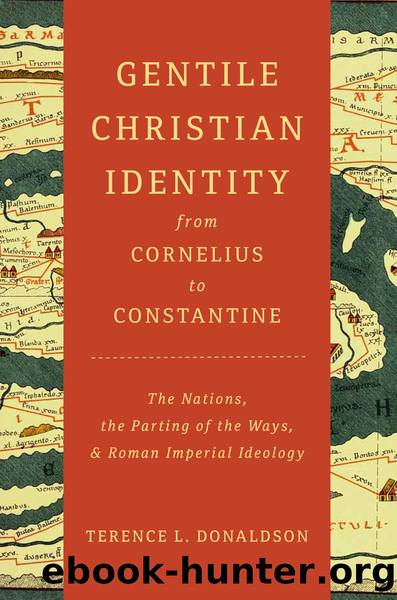Gentile Christian Identity From Cornelius to Constantine by Terence L. Donaldson;

Author:Terence L. Donaldson;
Language: eng
Format: epub
Publisher: INscribe Digital
Published: 2020-02-15T00:00:00+00:00
ROMAN IMPERIAL IDEOLOGY AND THE NATIONS
With Vitruviusâs confident declaration of Romeâs divinely ordained destiny âto rule the world,â we move from general matters of semantics and usage to the place of the nations in Roman imperial ideology and related discourse. For the most part, we will concentrate on the main themes of Roman ideology itself, though we will pay attention to ways in which these themes link up with the broader aspects of competitive ethnologyâboth Romeâs own endeavors to locate itself centrally with respect to Greeks and barbarians on an ethnic map of the world, and corresponding endeavors on the part of the subject nations to preserve or create a meaningful place for themselves.
We have had several opportunities already to explore Roman imperial ideology and to identify its characteristic themes.76 Here we will build on this work by looking at the significant place of the nations in these themes, thus arriving at a richer understanding of gentes, nationes, and ethnÄ as identity terms and instruments of identity construction in the Roman world. Since Roman conceptions are more directly in view in this section, we will begin with Latin material and then move to the Greek.77 With respect to the latter, while we are primarily interested in material in which Greek writers reproduce Roman ideology, we will also remain alert to the kind of strategic reserve that we have already noted in our initial discussion of Aelius Aristidesâs Regarding Rome, who praises Rome by echoing the Romansâ own congratulatory self-presentation but in ways that preserve a place for Greek priority and areas of Greek superiority.
The first thing to observe, however, is not so much a theme of Roman imperial ideology as it is a presupposition of the ideology as a whole. In the previous section, where we observed how nations functioned as a fundamental element in any discussion of the habitable world, we had occasion to note in passing that nations functioned as a fundamental component of empires as well, including the Roman Empire. Here we will look more closely at the way in which nations appear as a fundamental constituent element of the Roman Empire. This is not to deny that other things could be included; cities, kingdoms, lands, seas, and other human or natural entities also came into view.78 Nevertheless, the most common conception of the Roman imperium was that it was constituted by rule over the nationsâeven of âall the nations.â While the point will continue to emerge from our discussion of primary sources in other contexts, here we will look particularly at places where the language of empireâin word (imperium, imperator, dominus; archÄ, hÄgemonia, autokratÅr; etc.) or visual symbol (e.g., official inscriptions)âis in view.
To begin with an early exampleâa remarkable statement that can almost be seen as a condensed version of imperial ideology as a wholeâthe unknown author of the Rhetoric for Herennius speaks of âthat sovereignty over the whole world [imperium orbis terrae] which all nations, kings, and national groups [omnes gentes, reges, nationes] have accepted,
Download
This site does not store any files on its server. We only index and link to content provided by other sites. Please contact the content providers to delete copyright contents if any and email us, we'll remove relevant links or contents immediately.
The Lost Art of Listening by Michael P. Nichols(7170)
Why I Am Not A Calvinist by Dr. Peter S. Ruckman(4049)
The Rosicrucians by Christopher McIntosh(3375)
Wicca: a guide for the solitary practitioner by Scott Cunningham(3046)
Signature in the Cell: DNA and the Evidence for Intelligent Design by Stephen C. Meyer(2879)
Real Sex by Lauren F. Winner(2873)
The Holy Spirit by Billy Graham(2782)
To Light a Sacred Flame by Silver RavenWolf(2681)
The End of Faith by Sam Harris(2637)
The Gnostic Gospels by Pagels Elaine(2402)
Waking Up by Sam Harris(2334)
Nine Parts of Desire by Geraldine Brooks(2283)
Jesus by Paul Johnson(2232)
Devil, The by Almond Philip C(2207)
The God delusion by Richard Dawkins(2192)
Heavens on Earth by Michael Shermer(2190)
Kundalini by Gopi Krishna(2094)
Chosen by God by R. C. Sproul(2058)
The Nature of Consciousness by Rupert Spira(1983)
